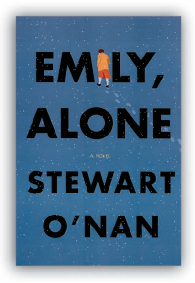Emily, Alone by Stewart O'Nan, MFA '92 (Viking)

Emily, Alone by Stewart O'Nan, MFA '92 (Viking)
After the death of her husband, Emily Maxwell stops driving, and her life narrows down to a diminishing number of routines, including a weekly trip with her sister-in-law, Arlene, to a two-for-one breakfast buffet. But when Arlene suffers a stroke, Emily realizes her world needs to open up. She stops isolating herself in her Pittsburgh neighborhood and starts engaging with her surroundings again: the city's planetarium, the art museum, her family. In his twelfth novel—the sequel to Wish You Were Here—O'Nan paints an unsentimental portrait of an octogenarian who reaches beyond her own concerns to become a full participant in life.

Ithaca Farmers Market Cookbook by Michael Turback '66 (Farm Fresh Books). The Ithaca Farmers Market is not only a great place to find fresh fruits and vegetables, crafts, and prepared food, it's a model for farmers' markets around the country. It also stands at the forefront of the local food movement, and its vendors practice the thirty-mile rule: every item for sale must be grown or produced within a thirty-mile radius of Ithaca. Author and restaurateur Michael Turback, who helped popularize cooking with local ingredients at his signature restaurant, profiles the market's vendors and chefs and offers 100 of their best recipes.
Composing While Dancing by Melinda Buck-walter '83 (Wisconsin). "If a dance is ephemeral, at least it is repeatable, but an improvised dance has the possibility of changing from moment to moment," writes Buckwalter, the co-editor of Contact Quarterly. Trying to capture the essence of improvisation, she studied with choreographers and dancers to get a feel for their practices. "This book was researched with my body," she writes. Buckwalter explores the varied techniques and methods of twenty-six artists whose work is representative of the field of contemporary dance improvisation. She also describes ways for dancers to develop their own practices.
The Mangrove Tree by Susan L. Roth & Cindy Trumbore '78; edited by Louise May '68 (Lee & Low). This picture book highlights the work of Gordon Sato, an American biologist who taught the people of coastal Hargigo, Eritrea, to plant mangrove trees in sea-water. Mangrove leaves provide fodder for sheep and goats, and the roots offer hiding places for small fish and shellfish. The trees—now more than a million planted in Hargigo alone—have improved the economic lives of the villagers. Sato has started similar projects in Mauritania and Morocco, and hopes to bring the benefits of mangrove forests to other desert areas.
Dear Friend Amelia by Mary Jordan & Joyce Hatch with Ronald E. Ostman & Harry Littell (Six Mile Creek). Jordan, an administrative assistant in Cornell's Department of Developmental Sociology, received the Civil War letters of John Tidd, a private in the 109th New York Volunteers, shortly after they were discovered inside the walls of a Tompkins County house in 1972. Tidd's moving letters to his friend Amelia Haskell reveal the routine of a soldier's life and his experiences in such battles as the Wilderness, Spotsylvania Court House, and Cold Harbor, and trench warfare during the Siege of Petersburg.
Fiction
Journal of a UFO Investigator by David Halperin '69 (Viking). In a novel about the illusions we create to ward off death, young Danny Shapiro becomes obsessed with UFOs to escape the reality of his mother's terminal illness.
Haywire by Thaddeus Rutkowski '76 (Starcherone). The narrator of Rutkowski's third novel tells an offbeat and often disturbing coming of age story with dry wit and a keen eye for absurdity.
Non-Fiction
If I Were Your Daddy, This Is What You'd Learn compiled by Julia Espey (Courtland). As one of the thirty-five men who offer advice on fatherhood, Rick Lipsey '89, golf writer for Sports Illustrated and Bhutan's first full-time golf teacher, talks about the importance of teaching his children the Golden Rule and instilling them with an "attitude of gratitude."
Human Trafficking by Louise Shelley '72 (Cambridge). The founder and director of the Terrorism, Transnational Crime, and Corruption Center at George Mason University exposes the factors that have given rise to the phenomenal growth of human trafficking since the mid-Eighties, including globalization and the end of the Cold War.
The Kabbalah Reader edited by Edward Hoffman '71 (Trumpeter). The Kabbalah is not "something existing only in the musty past like the legendary golem preserved in Rabbi Judah Loew's great Prague synagogue," asserts Hoffman, a psychologist and adjunct professor at Yeshiva University, "but rather an energetic, ongoing tradition."
G. Evelyn Hutchinson and the Invention of Modern Ecology by Nancy G. Slack '52, MS '54 (Yale). A professor emerita of biology at the Sage Colleges provides the first full-length biography of Hutchinson, the Anglo-American ecologist who was famous not only for his studies of freshwater lakes but also as the literary executor of Rebecca West.
Sports Justice by Roger I. Abrams '67 (Northeastern University Press). A law professor at Northeastern University analyzes controversial court decisions that changed the business of professional sports and protected athletes' rights.
Medical Imaging by Harry LeVine III '71 (Greenwood). While tracing the development of diagnostic imaging from the discovery of X-rays to today's MRIs, positron emission tomography, and single photon emission computed tomography, an associate professor of biochemistry at the University of Kentucky also explores how these technologies contribute to rising health-care costs.
Trial in Action by Joane Garcia-Colson, Fredilyn Sison '85, and Mary Peckham (Trial Guides). An attorney with the Federal Defenders of Western North Carolina and her co-authors offer tips on becoming a more effective trial lawyer by using techniques of psychodrama.
The Secret History of Extraterrestrials by Len Kasten '55 (Bear & Co.). A UFO researcher examines abduction accounts, reported contacts with ETs, and alleged government cover-ups of alien encounters, and profiles John Mack and other well-known investigators of extraterrestrial phenomena.
Spiritually Healthy Divorce by Carolyne Call '86, PhD '04 (Skylight Paths). A guide for turning the pain of divorce into a transformative experience.


